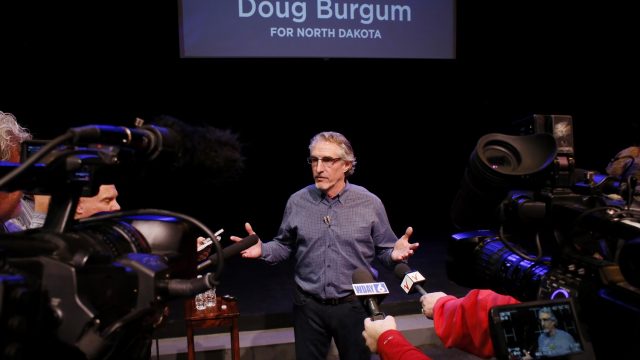Doug Burgum Slams "Runaway Government Spending" But Helped Elect Big-Spending Governor

NDGOP gubernatorial candidate Doug Burgum was quick to react to news of new revenue shortfalls coming out of Bismarck today (my previous post here).
“Unfortunately, today brings more bad news for families across North Dakota,” Burgum said in an emailed statement this afternoon. “The collapse in energy and commodity prices has created a billion dollar and growing budget shortfall.”
He went on to blast the state’s budget growth as a big part of the problem.
“Runaway government spending put us in this mess, and it’s going to take a business leader to diversify our economy, reign in spending, and reinvent state government,” he said.
Burgum’s not wrong. North Dakota doesn’t have a revenue problem so much as a spending problem.
That said, who helped elect the big-spender in office right now?
Take a look at the trend line for North Dakota’s general and special fund pending (via Legislative Council). Combining general and special fund spending, we’ve seen a more than 207 percent increase in state spending since the 2005-2007 biennium.
The last three biennium budgets have started in Governor Jack Dalrymple’s office and represent a 101 percent increase in state spending, even account for the 12 percent decline in spending in the current biennium (not taking into account February’s allotments):

Governor John Hoeven, Dalrymple’s predecessor, was a spender. But Dalrymple put Hoeven to shame. He stomped on the accelerator on state spending, and didn’t let up until it was clear that revenues weren’t going to support it any more.
And even then, given that we’re now looking at a second round of allotments, Dalrymple didn’t back off enough.
“But what about the one-time spending?” defenders of this spending will ask us.
Well, let’s look at that breakdown, again via Legislative Council (this is the general fund only now):

Even if we only look at what has been classified at “one-time spending” (and I’d argue that even a lot of the spending in that category has implications for budgets long-term), during Dalrymple’s time in office we see a 62 percent increase in spending.
So yes, Mr. Burgum, we’ve got a spending problem.
But here’s the question Burgum needs to answer: Who chaired Dalrymple’s re-election committee?
Doug Burgum did.
If Burgum wants to make a stink about state spending, he needs to take some responsibility for helping to elect the spender.




